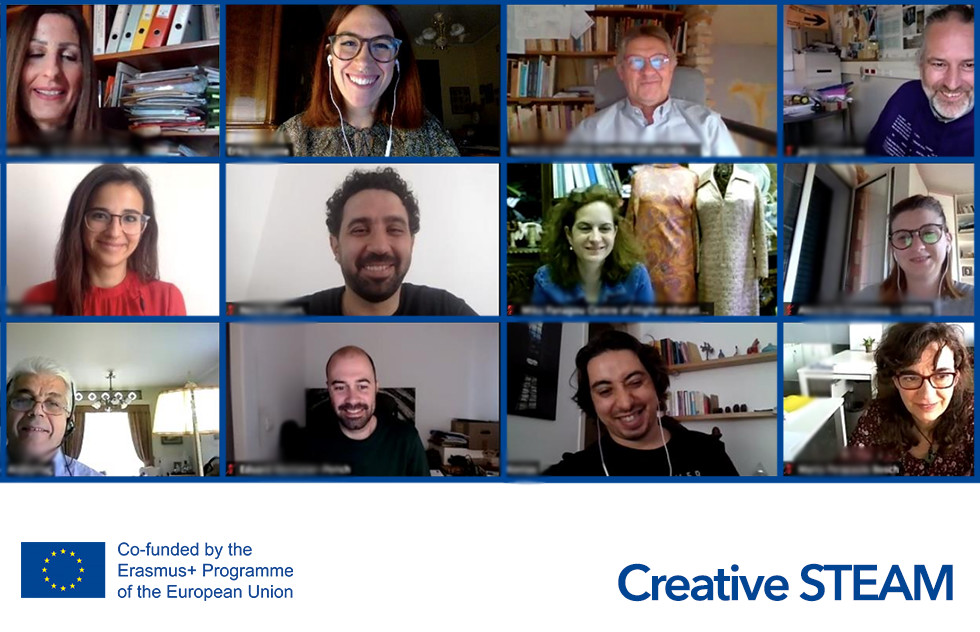Project name: Creative STEAM – Increase of the secondary school students interest in STEAM through theatre
Project number: 2020-1-EL01-KA227-SCH-094716
Duration: 24 Months
Coordinator: KENTRO SPOUDON LAIKOU THEATROU (Greece)
Financed by: European Commission under the Erasmus+ programme KA2 – Cooperation for innovation and exchange of good practice
Partners: CEIPES – CENTRO INTERNAZIONALE PER LA PROMOZIONE DELL’EDUCAZIONE E LO SVILUPPO ASSOCIATION (Italy), ACTION SYNERGY SA (Greece), MOBILIZING EXPERTISE AB (Sweden), UNIVERSITAT DE GIRONA (Spain), 2nd Gymnasium Geraka (Greece).
The Kick off Meeting (KOM) of the project was held on 29 April 2021.
“Creative STEAM – Increase of the secondary school students interest in STEAM through theatre”; due to the COVID-19 emergency, unfortunately the meeting was held online.
The KOM was a great moment of sharing made possible by the organisational capacity of the project coordinator and the cooperation of all 5 European partners, each with different backgrounds and competences.
As the use of drama as a learning method in schools is not widespread and the available resources are currently fragmented, the aim of the project is to integrate the use of drama techniques in secondary schools through the development of appropriate tools and networks. In fact, the Creative STEAM project aims to increase secondary school students’ interest in STEM (Science, Technology, Engineering and Mathematics) disciplines, i.e. all those disciplines that include science, mathematics, biology, chemistry etc. and whose learning is facilitated by integrating the arts: STEAM (Science, Technology, Engineering, Arts and Mathematics), in particular, by including various theatre techniques.
This will create the conditions to bring young people closer to STEM disciplines; improve students’ academic performance in basic skills with special attention to the integration of young migrants or refugees, who may need more and different inputs.
The project will improve the educational performance of students in basic skills with special attention to the integration of young migrants or refugees, who may need more and different stimuli for learning and for overcoming possible language/cultural barriers.
In order to achieve these objectives, the partnership defined the following outcomes:
O1: Methodology.
O2: Workshops for teachers.
O3: E-learning courses for teachers.
O4: Video library.
The KOM started with a short presentation of the involved organisations, proceeding with a general introduction of the project. Thanks to the valuable input of each organisation, it was possible to understand in practice the various ways in which theatre can be integrated into education and in particular into the STEM field. Subsequently, the work programme was defined, setting the upcoming deadlines and elaborating on the various activities to be carried out. First of all, Output 1 (O1) will be developed, which foresees the creation of a methodology to implement theatre techniques in the teaching of STEM disciplines, adopting an integrated approach. Then, the activities foreseen for Output 2 and 3 (O2 – O3) will be carried out, i.e. the organisation of workshops and e-learning courses to train teachers on how to apply the developed methodology in the reference classes, i.e. secondary schools. Finally, with regard to Output 4 (O4), a collection of videos considered as teaching materials open to all will be produced, which can show practical and effective examples of the use of drama for teaching STEM disciplines.
Before concluding the meeting a moment of discussion was held, about promoting and sharing the resources that will emerge during the development of the project and that will benefit teachers across Europe. The impact of the project will bring a significant increase from the world of drama and education, the introduction of innovative methods for improving teacher training and the availability of innovative learning resources. This will increase the attractiveness of classroom lessons; facilitate the acquisition of basic skills for students, who may be more willing to participate in new, more interactive learning activities than in traditional classrooms; and facilitate the expansion of international networks and contacts between teachers.
The partners will meet afterwards for an online discussion to monitor the progress of the project.
To find out more about the project follow our social accounts on Facebook, LinkedIn, Instagram and Twitter.
